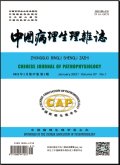中国病理生理杂志2024,Vol.40Issue(7):1182-1189,8.DOI:10.3969/j.issn.1000-4718.2024.07.004
茶多酚通过介导细胞自噬提高人胃癌细胞对奥沙利铂的敏感性
Tea polyphenols enhance sensitivity of human gastric cancer cells to oxali-platin by mediating autophagy
摘要
Abstract
AIM:To investigate the effect of tea polyphenols(TP)on the sensitivity of human gastric cancer cells to oxaliplatin(L-OHP)in vitro and its mechanism.METHODS:Human gastric cancer HGC-27 and N87 cells,and human gastric mucosal GES-1 cells were used in this study.The HGC-27 and N87 cells were randomly assigned into con-trol group,TP(5 µmol/L)group,L-OHP(5.2 µmol/L for HGC-27 cells,7.7 µmol/L for N87 cells)group,and TP(5 µmol/L)combined with L-OHP(5.2 µmol/L for HGC-27 cells,7.7 µmol/L for N87 cells)group,with 3 replicate wells per group.The cell viability was detected by CCK-8 assay,and the IC50 value of L-OHP was calculated.The proliferation of the cells was assessed by colony formation assay.The migration and invasion abilities of the cells were evaluated by scratch test and Transwell assay.Flow cytometry was performed to evaluate the antiapoptotic effect of the treatments.Ade-novirus infection was conducted to evaluate cell autophagy.The levels of intracellular reactive oxygen species(ROS)were assessed using a ROS assay kit.Western blot analysis was performed to evaluate the protein expression levels of microtu-bule-associated protein 1 light chain 3(LC3),nuclear factor E2-related factor 2(Nrf2),heme oxygenase-1(HO-1)and superoxide dismutase 1(SOD1).RESULTS:Combination of TP and L-OHP significantly reduced the viability of HGC-27 and N87 cells,and markedly inhibited cell proliferation and migration compared with L-OHP alone.Significant increas-es in autophagosomes and ROS levels were observed in combination group compared with L-OHP alone group.The ratio of LC3-II/LC3-I significantly increased in combination group,whereas the expression of Nrf2,HO-1 and SOD1 significantly decreased compared with L-OHP alone group(P<0.05).CONCLUSION:Treatment with TP enhanced the sensitivity of HGC-27 and N87 cells to L-OHP by inhibiting the Nrf2 pathway,promoting the production of intracellular ROS,and in-ducing cell autophagy.关键词
胃癌/茶多酚/奥沙利铂/自噬/活性氧Key words
gastric cancer/tea polyphenols/oxaliplatin/autophagy/reactive oxygen species分类
医药卫生引用本文复制引用
董钦鹏,孙晓东,刘君瑞,王鑫澳,刘家铭,李恒平..茶多酚通过介导细胞自噬提高人胃癌细胞对奥沙利铂的敏感性[J].中国病理生理杂志,2024,40(7):1182-1189,8.基金项目
国家自然科学基金资助项目(No.81703015) (No.81703015)
湖北省科技计划项目(No.2021CFB582) (No.2021CFB582)

